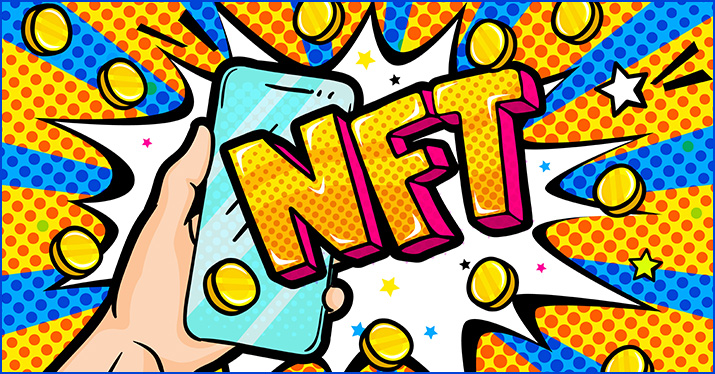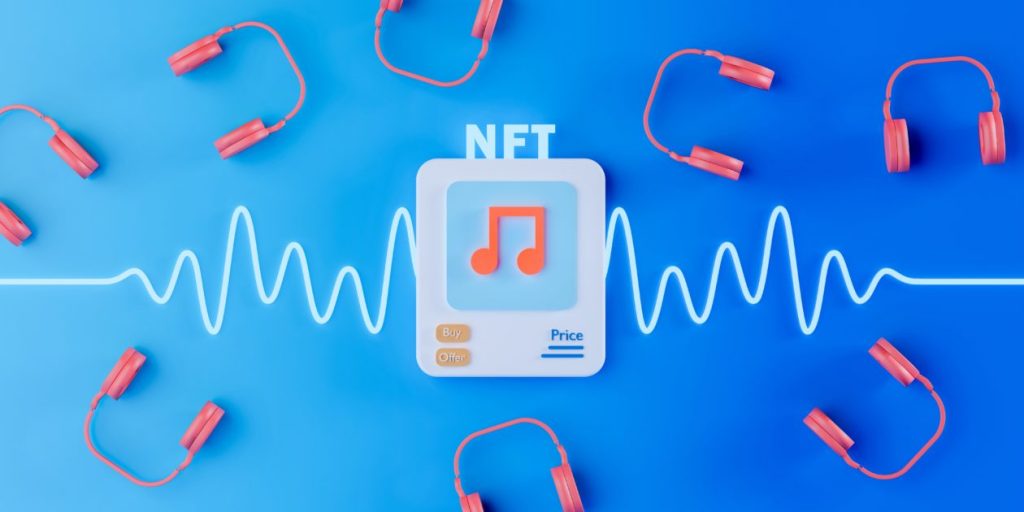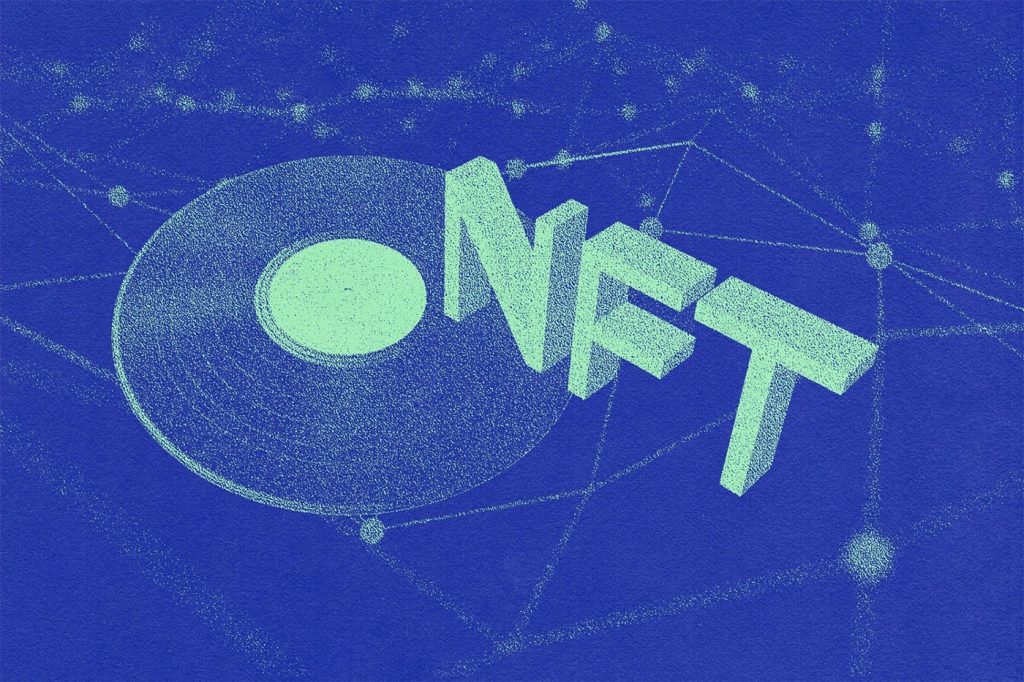NFTS are Shaking Up the Music Industry
NFTS are Shaking Up the Music Industry
There was a time when all you could purchase with non-fungible tokens (NFTs) were those mopey monkeys that people inexplicitly bought for ridiculous amounts of money. Today, NFTs can do so much more than buy Bored Apes – especially for the music industry.
As you probably know, an NFT is a digital asset that represents real-world objects, such as art, in-game items, and music. Like other types of cryptocurrency (crypto), NFTs are bought and sold online through a digital database that creates a permanent, transparent record of the transaction. An NFT functions somewhat like a zip file with artwork on the front and nifty assets, such as music, tickets or videos, on the inside.
NFTs are still in their infancy, but their potential is becoming clear. Some of music’s heaviest hitters, such as Linkin Park’s Mike Shinoda and Kings of Leon, have already adopted NFT technology to reach more fans. The musician known as Grimes launched an NFT campaign that combined artwork and videos set to music, and she raked in a cool $6 million – which is the equivalent of a couple of billion Spotify streams. These fat stacks allow artists to compete with record labels while retaining ownership of their masters and their work.
New Opportunities for Partnerships
NFTs also create opportunities for collaboration. Intercept Music recently partnered with Method Man to create a new platform for independent labels and music artists, intending to create a digital distribution platform that empowers both artists and labels by giving them access to hundreds of digital stores and major streaming outlets. Intercept Music has partnerships with some of the biggest music marketplaces and distribution services, including Nifter.
These collaborations may be a lifesaver for artists, who suffer from a broken music industry that splits profits between the big dogs and leaves the musicians with pennies on the dollar. NFTs offer a more sustainable and equitable model for artists by creating a system that gives musicians more control over their work, and in the end, puts more money in their pockets.
NFTs Enhance the Connection between Creators and Fans
NFTs also work out for the fans, in that they create an opportunity for artists to connect with their base in a more personal (and profitable) way. Users often have a passive relationship with music – they listen to their favorite songs without any interaction with the artists that created them. Until NFTs came along, the only way for fans to gain greater ownership of their relationship with the artists was to buy VIP tickets with meet-and-greet or to purchase merchandise.
NFTs foster a more dynamic relationship by giving listeners an opportunity to engage and participate with the artist in ways that go well beyond the merch table. Fans can purchase limited edition or one-of-a-kind albums, buy physical or digital merchandise, or even interact with their favorite artists online.
But what about the “crypto winter?”
Bitcoin and other types of cryptocurrency have recently experienced a downturn, dubbed by many as “crypto winter.” Prices dropped and remained low, creating a bear market that has chilled interest in NFTs for some investors. Crypto winter has not frozen out many big players, though.
“I feel like every great industry has a downfall,” said Snoop Dogg when asked if he was concerned about the current crypto crash, for example. “There’s been a depression in every industry you can look at: alcohol, tobacco, clothing, food; every industry you can imagine.”
The music mogul isn’t alone. Billionaire Mark Cuban compared the crypto crash to the lull the internet experienced when the dotcom bubble burst. Cuban even went so far as to say that the NFT space was oversaturated with wanna-be investors, and that cyber winter weeded out all the people who weren’t supposed to be there. Snoop, Cuban and other NFT enthusiasts are still hot for the digital currency.
How do you make an NFT?
Making an NFT is easier than you probably realize. The first step, of course, is to find out as much you can so that you go into the venture wisely. Learn about gas fees, for example, which is the fee you pay to execute any transaction on the blockchain. The more you know before you dive in, the more successful your NFT venture will likely be.
Pick an asset
You can turn almost any digital file into an NFT, as long as you are the sole owner and nobody else has intellectual property rights.
- Music
- Video clips
- Pictures
- Artwork, such as drawings or paintings
- Tweets and other online content
- GIFs and memes
Start simple with an audio clip, video, or image, as these are the most commonly accepted formats in various marketplaces.
Choose a blockchain
A blockchain is a type of public ledger that records transactions made in bitcoin or other types of cryptocurrency. Ethereum and Solana are the top blockchains choices for NFT creators.
Choose a marketplace
Marketplaces are the online platforms in which users store, display, buy, sell, trade, and mint NFTs. NIFTER, Nifty Gateway, OpenSea and Rarible are among the most popular marketplaces.
Set up a digital wallet and add cryptocurrency
You’ll store your cryptocurrency in your digital wallet. MetaMask, Coinbase Wallet, and Alpha Wallet are among the most popular. Be sure to choose a digital wallet accepted by your marketplace of choice.
Upload your file
Upload and create a file that contains your NFT. Once you gain experience in uploading your NFTs, you can mint (publish) them directly on the blockchain. Newbies should use the minting tools provided by their marketplace. Connect your digital wallet to the marketplace to establish a payment system. Once your digital wallet is connected, the marketplace will publish your NFT. Your marketplace will assign unique metadata to your asset and record it on the blockchain. If you’d like, you can create extra value for your NFT by adding a smart contract that lays out the terms and conditions of the transaction.
Next, sit back and rake in the money. You can list your NFT at a fixed price or sell it auction-style to the highest bidder. While many NFTs never sell or earn very little money, it is entirely possibly that you will be the next music NFT to rise above and find success.
ABOUT FRANK MAGLIOCHETTI
Frank Magliochetti owes his professional success to his expertise in two areas: medicine and finance. After obtaining a BS in pharmacy from Northeastern University, he stayed on to enroll in the Masters of Toxicology program. He later specialized in corporate finance, receiving an MBA from The Sawyer School of Business at Suffolk University. His educational background includes completion of the Advanced Management Program at Harvard Business School and the General Management Program at Stanford Business School. Frank Magliochetti has held senior positions at Baxter International, Kontron Instruments, Haemonetics Corporation, and Sandoz. Since 2000, he has been a managing partner at Parcae Capital, where he focuses on financial restructuring and interim management services for companies in the healthcare, media, and alternative energy industries. Last year, he was appointed chairman of the board at Grace Health Technology, a company providing an enterprise solution for the laboratory environment.
Frank is the CEO of ClickStream, ClickStream’s business operations are focused on the development and implementation of apps that disrupt such as WinQuik™, a free to play synchronized mobile app and digital gaming platform. The platform is designed to enable WinQuik™ users to have fun, interact and compete against each other in order to win real money and prizes. Twitter at @ClickstreamC @WinQuikApp, Nifter™, a music NFT marketplace that allows recording artists to create and sell limited edition authenticated NFTs, and their ever expanding foreign language exchange social learning app @HeyPalApp. ClickStream is also entering the E-Learning market with Joey’s Animal Kingdom- please visit them online at wowee.world
Frank was appointed Chairman and Chief Executive Officer at Designer Genomics International, Inc. The Company has accumulated a growing body of evidence that highlights a link between alterations in the immune and inflammatory systems and the development of chronic human disease. The Company is visionary and has established itself as a leader in the field of inflammatory and immune genetic DNA and RNA biomarkers that play a causative role in debilitating conditions, such as atherosclerosis/heart disease, diabetes, arthritis, inflammatory bowel disease, post-traumatic stress disorders (PTSD) and cancer.
A proprietary state-of-the art data mining bioinformatics program, called ‘cluster analysis’ will be used to measure disease development susceptibility with potential for earlier diagnosis and intervention. The company is developing a healthcare program based on its proprietary genetic panels that will allow people to be their own healthcare advocate and take an active role in their health status as well as longevity.
Frank is a highly sought after multifaceted senior C level executive.

Managing Partner
Parcae Capital
www.parcaecapitalcorp.com
www.frankmagliochetti.com















